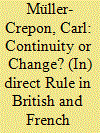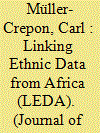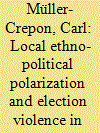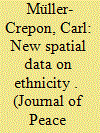|
|
|
Sort Order |
|
|
|
Items / Page
|
|
|
|
|
|
|
| Srl | Item |
| 1 |
ID:
175814


|
|
|
|
|
| Summary/Abstract |
Current political order in Africa is often linked to legacies of colonialism, in particular to legacies of indirect colonial rule. However, evidence about the application of indirect rule is scarce. In this paper I argue that empire-level characteristics interacted with precolonial institutions in shaping the indirectness of local rule. First, British governments ruled more indirectly than French administrations, which followed a comparatively centralized administrative blueprint, came with a transformative republican ideology, and had more administrative resources. Empirically, I find that French colonization led to the demise of the lines of succession of seven out of ten precolonial polities, twice as many as under British rule. Second, precolonial centralization was a crucial prerequisite for indirect rule. Local administrative data from eight British colonies show that British colonizers employed less administrative effort and devolved more power to native authorities where centralized institutions existed. Such a pattern did not exist in French colonies. Together, these findings improve our understanding of the long-term effects of precolonial institutions and draw attention to the interaction of characteristics of dominant and subordinate units in shaping local governance arrangements.
|
|
|
|
|
|
|
|
|
|
|
|
|
|
|
|
| 2 |
ID:
185193


|
|
|
|
|
| Summary/Abstract |
Social scientists in general and conflict researchers in particular increasingly combine multiple datasets to study ethnic politics and conflict in Africa. We facilitate these efforts by systematically linking over 8,100 ethnic categories from 11 databases, including surveys, geographic data, and expert-coded lists. Exploiting the linguistic tree from the Ethnologue database, we propose a systematic solution to the grouping problem of ethnicity. An analysis of political exclusion, mistrust of state leaders, and ethnic grievances highlights different ways of linking ethnic categories from multiple datasets. The LEDA open-source software package allows researchers to link ethnic groups from any database with explicit rules and to add their own data on ethnic groups.
|
|
|
|
|
|
|
|
|
|
|
|
|
|
|
|
| 3 |
ID:
184203


|
|
|
|
|
| Summary/Abstract |
How does local ethnic demography affect the conduct of majoritarian elections? Because legislative elections in majoritarian systems are contested locally, local ethno-political polarization increases the risk of pre-election violence. In districts that are polarized between politically competing ethnic groups, violence can be targeted with comparative ease at opposing voters, and can, if perpetrated collectively, mobilize the perpetrators’ co-ethnics. I do not expect such dynamics in PR systems where political competition plays out at higher geographical levels. To test this argument, I combine new data on the ethnic composition of local populations in 22 African countries with monthly data on riots and survey data on campaign violence. Ethno-politically polarized districts in majoritarian and mixed electoral systems see substantively larger increases in the number of riots prior to legislative elections and more fear of pre-election violence among citizens than non-polarized districts in the same country and at the same time. I do not find these patterns in PR systems. The results enhance our understanding of how electoral systems interact with local ethnic demography in shaping pre-election violence.
|
|
|
|
|
|
|
|
|
|
|
|
|
|
|
|
| 4 |
ID:
161556


|
|
|
|
|
| Summary/Abstract |
Research on ethnic politics and political violence has benefited substantially from the growing availability of cross-national, geo-coded data on ethnic settlement patterns. However, because existing datasets represent ethnic homelands using aggregate polygon features, they lack information on ethnic compositions at the local level. Addressing this gap, this article introduces the Spatially Interpolated Data on Ethnicity (SIDE) dataset, a collection of 253 near-continuous maps of local ethno-linguistic, religious and ethno-religious settlement patterns in 47 low- and middle-income countries. We create these data using spatial interpolation and machine learning methods to generalize the ethnicity-related information in the geo-coded Demographic and Health Surveys (DHS). For each DHS survey we provide the ethnic, religious and ethno-religious compositions of cells on a raster that covers the respective countries at a resolution of 30 arc-seconds. The resulting data are optimized for use with geographic information systems (GIS) software. Comparisons of SIDE with existing categorical datasets and district-level census data from Uganda and Senegal are used to assess the data’s accuracy. Finally, we use the new data to study the effects of local polarization between politically relevant ethnic groups, finding a positive effect on the risk of local violence such as riots and protests. However, local ethno-political polarization is not statistically associated with violent events pertaining to larger-scale processes such as civil wars.
|
|
|
|
|
|
|
|
|
|
|
|
|
|
|
|
|
|
|
|
|